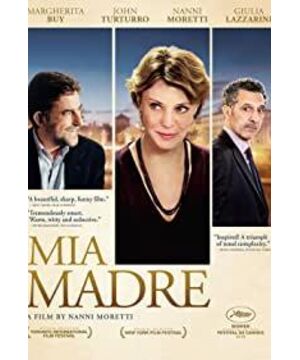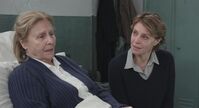No longer exploring methods of psychotherapy, in "My Mother", Nanni Moretti turns to insight into the nature of psychological problems: power relations.
The play is homogeneously divided into three levels: the middle-aged female director is shooting a film about labor-management conflicts, the workers protest the boss’s decision to lay off workers, and they fight for the right to work through demonstrations (serious play); at the filming site, the director Contradictions with American actors continue. The actors question the director’s filming methods. The director hates the narcissism and amateurism (comedy) of the actor; the director faces her dying mother and commutes between the studio and the ward. She feels anxious because of her powerlessness. And depression (tragedy).
Workers, actors, and mothers are attached to capitalists, directors, and daughters, respectively. Having power means gaining control, but it can also mean losing control. This is the source of all pain.
The director tells the actors: play your role well, but also to drift outside of your role. In order to play the role of her daughter, she temporarily bought food heated to take it to the ward (the mother did not eat it), she stared at the drip until the last drop fell, she deliberately smashed the front of her mother's car, and urged the weak mother to walk. She tried awkwardly, immersed in the role's sense of responsibility (sense of power), but she also lost her sensibility.
It wasn't until the room was flooded that she returned to her mother's residence when she was young. When she returned the power to her mother, we suddenly realized what it meant to be outside of the role. She saw a whole wall of books, "Lucretius, Tacitus... what should I do with these books in the future? They occupy a whole wall of my mother. The gains from her studies and work over the years will be Where to go? She spent so much time every day...every day!" Her loss and grief finally communicated with her mother. When she was aphasia, her mother wrote in a pencil: "You stay a little longer, this is the best Treatment." Her wish was nothing more than that.
The mother who is dying is about to lose the right to have life. She was lost and walked on the street. She didn't want to leave the ward and wanted to say goodbye to the nurse. She looked in the mirror and arranged her clothes, hoping to go out for dinner. She taught her granddaughter the Latin grammar. The daughter asked her: "Mom, what are you thinking?" She replied: "Tomorrow"-the tomorrow she is about to lose.
All power relations become insignificant in the face of the passage of life, and all anxiety, mania, and depression will disappear. The director used the present and memories, reality and fantasy to make her daughter touch the boundary between life and death. The random editing is no longer leading, but creates a certain balance of time and space in frequent immersion and withdrawal. It is also a balance between walking and staying, seeking and giving up.
Compared with many directors with unique and radical styles, Nanni Moretti's realistic images always appear to be particularly traditional, plain and simple. This can't help but make many people who advocate audiovisualism wonder: What exactly is Cannes commending Nanni Moretti? Perhaps it is an attitude, a detached attitude that uses triviality to untie the psychological frustration and humor to dispel the pain of life. When Italian neorealism is no longer social and critical, it can also be private and curative.
View more about Mia madre reviews









